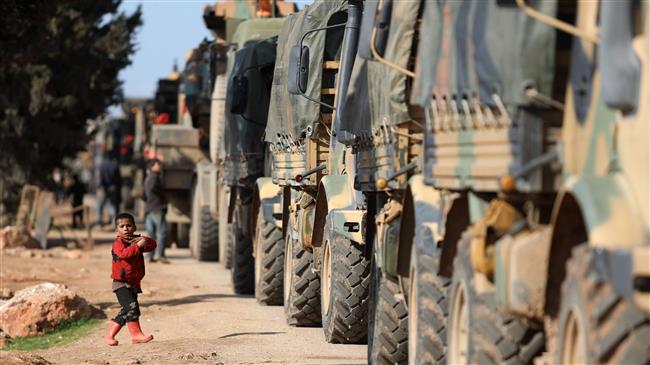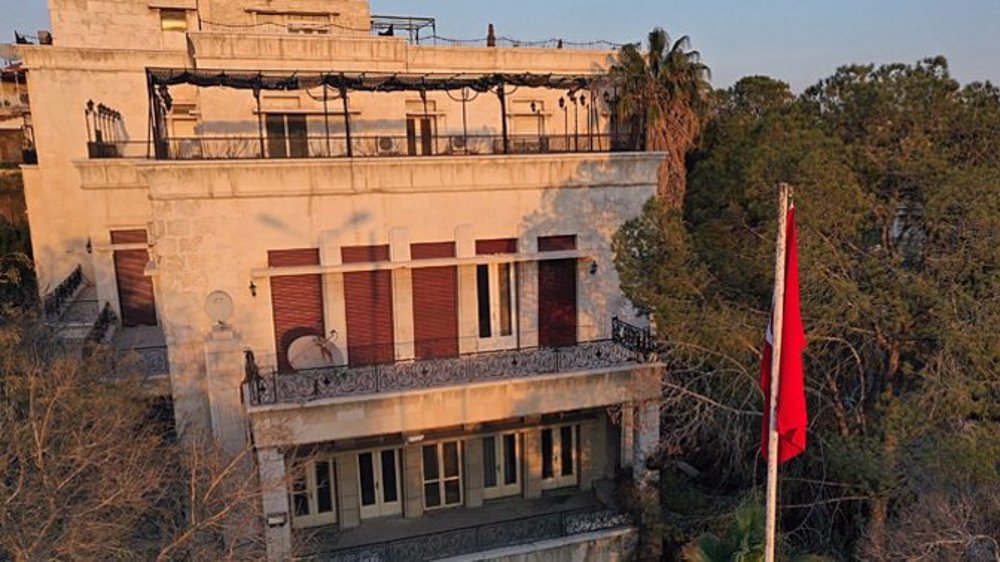Turkey dispatches another military convoy to Syria’s Idlib: Group
A monitoring group says Turkey has dispatched a new military convoy to Syria’s northwestern province of Idlib, despite a recent ceasefire deal that Ankara has signed with Moscow to halt the escalation of violence there.
The British-based Syrian Observatory for Human Rights (SOHR), citing what it said were activists requesting anonymity, said on Tuesday that a Turkish convoy of some 35 military vehicles entered Syrian territory through the Kafr Lusin border crossing and headed toward Turkish positions.
The group added that the number of Turkish military units that had entered the Idlib de-escalation zone ever since the ceasefire came into effect in the area last month had increased dramatically to more than 5,950.
It said the number of Turkish soldiers deployed to northwest Syria since February 2 also stood at over 10,300.
The information could not be independently verified. There was no immediate confirmation from either Damascus or Ankara.
On March 5, Russia and Turkey, which support opposite sides in the Syrian conflict, came to an agreement on a ceasefire regime in Idlib, where Turkish aggression against the Syrian government had risked sparking a war.
Under the agreement, joint Russian-Turkish patrols secure a six-kilometer-wide corridor along a highway connecting the two government-held provinces of Latakia and Aleppo.
The two sides fleshed out the agreement on March 13.
Turkey sends Kurdish militants to Libya
In a separate development on Tuesday, a spokesman for the self-proclaimed Libyan National Army (LNA) under the command of renegade general Khalifa Haftar claimed that Turkey was sending the militants it had trained in Iraq’s Kurdistan region to fight in the North African country.
Ahmed Mismari said in a press conference in the eastern Libyan city of Benghazi that the militants had been trained by the Turkish military in the city of Erbil in Iraq’s semi-autonomous Kurdistan.
The spokesman said the militants received training from Turkey’s “Lashkari Roj” forces.
In February, Turkish President Recep Tayyip Erdogan confirmed for the first time the presence of pro-Turkish Syrian militants in Libya.
Libya’s internationally recognized government, led by Prime Minister Fayez al-Sarraj, has previously sought Turkey’s support against rebel forces loyal to Haftar, who receives support from Egypt, Saudi Arabia, and the United Arab Emirates.
Haftar’s rebels have been fighting to seize the Libyan capital.
Libya plunged into chaos in 2011, when a popular uprising and a NATO intervention led to the ouster, and later killing, of long-time dictator Muammar Gaddafi.
Since 2014, Libya has been divided between the Tripoli-based government and a camp in the eastern city of Tobruk, supported militarily by Haftar’s rebels.
Peace talks to end the fighting in Libya have failed. A shaky ceasefire has been agreed but has been routinely violated.
According to the latest UN tally, more than 280 civilians and roughly 2,000 fighters have been killed since Haftar launched his offensive in April to seize Tripoli. An estimated 146,000 Libyans have been displaced.
Dec. 21: ‘Axis of Resistance’ operations against Israeli occupation
Spain jurists demand ties with Israel ties be cut
VIDEO | Press TV's news headlines
VIDEO | Iran honors top Science Olympiad medalists
VIDEO | Austrians arrested at Gaza protest in Vienna
10 killed in bus crash in western Iran
VIDEO | One-man-band journalism with Civili
5 Israeli forces killed as Palestinian fighters face up to regime’s war machine













 This makes it easy to access the Press TV website
This makes it easy to access the Press TV website